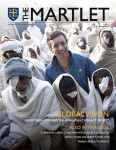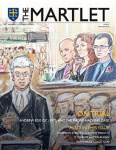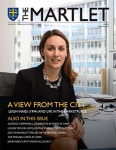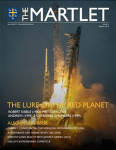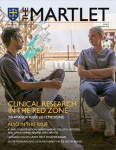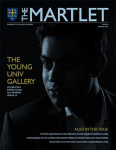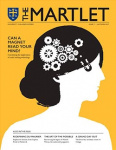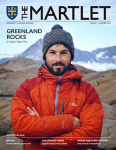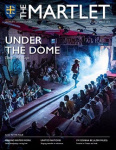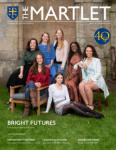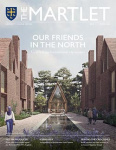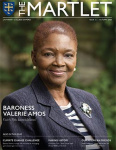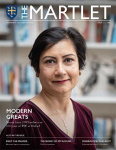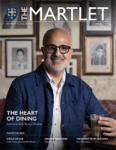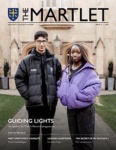Profile: John Weltman
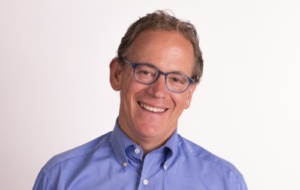
John Weltman (1979, History)
John Weltman graduated from Yale in 1979, matriculated at Univ that same year, where he stayed until 1981, leaving for the University of Virginia School of Law. He has his BA, MA (History – thesis on espionage during the Cromwellian Protectorate) and JD. He is a lawyer with over 38 years of commercial litigation (barrister) experience and is the founder of the largest surrogate parenting agency in America, Circle Surrogacy, now in its 28th year. John and his husband of 34 years (together nearly 40), Cliff, were the first gay couple to have children through surrogacy in the United States. Their boys are now 28 (radio frequency engineer at an internet service provider) and 26 (PhD candidate in Paleontology).
What brought you to Univ?
I had a wonderful history teacher in high school. We not only watched Elizabeth R and The Six Wives of Henry the VIII, but we also got an opportunity to litigate the Trial of Edmund Campion (I was the prosecutor). It made the period come alive. At Yale, Jack Hexter, Sterling Professor of History, taught a class called “The writing of history.” He handed us the 105 pages of existing primary source material from the 1st Parliament of King James I, and said, “Go write a paper.” Then, he asked us to pass our paper to the person on our left and edit it. Then he sat us in groups and talked about our edits. Then he had us rewrite the papers. It was more like an Oxford class than anything at Yale. His reference, claiming in an understated way for an American, that I was competent to do the work, was apparently the reason I was accepted at Univ! I thought it would be amazing to study history at Oxford. I began by trying to write a biography of John Thurloe, Secretary of State for Cromwell, though by the end of my first year I decided to focus on his forte, espionage. I ended up writing a 250 page thesis.
I made four of my best friends in the world at Oxford. The people were exciting because they were bright, but also open and warm. You could, especially if you had port, sherry, coffee or tea, sit for hours talking. I never felt judged or competed with. People were open and accepting.
To this day, Univ was probably the two best years of my life because of the friendships, the travelling, and the education.
Were you out at the time you were at Univ and was there a gay Univ? These days you’ve got an LGBTQ+ society and there’s the LGBTQ+ formal.
I hadn’t really told any friends that I was gay. It didn’t mean that I didn’t have men in my life, but I was primarily with women, both at Yale and at Oxford. I felt that Yale was an extraordinarily homophobic environment. That wasn’t true at Oxford. I didn’t feel uncomfortable. There were people who knew that I had had experiences and was interested in guys. It wasn’t an issue. But there certainly weren’t any gay societies or formals.
How did you get into surrogacy and how did you end up setting up the business?
I had been the eldest of four kids and I always wanted to have kids. Very early on, I told Cliff that this was a dream of mine. About seven years later, we’d gotten married in a Unitarian Church and lost three of our closest friends. It felt like the right time, realising how short life can be. We decided on surrogacy because I wanted a biological child and he wanted to avoid the uncertainty of genetics with adoption. After having kids I have found that genetics is sort of meaningless and that in many respects – we both love our children equally – but my husband is closer to my biological son, and I’m closer to his biological son. My genetic son looks like me and has interests like Cliff and his biological son looks like him and has characteristics more like me. So, I truly believe in nature and nurture. We ended up being the very first American gay couple to each have a child by the same surrogate mom. We’re still in touch with her, over 30 years later.
I started the surrogate parenting agency unintentionally. I helped the surrogacy agency we used with contracts and later when they got sued for malpractice in a lawsuit, I represented them, and we won the jury trial and appeal. Suddenly, people started asking me to find them a surrogate. I told them I was not an agency but I could write contracts. One female physician I was doing contracts for found as potential surrogates a friend and a nurse in her practice, both of whom passed screening. When she picked the friend, the nurse sent me her medical records and testing asking to be matched. I was going to advise her that I didn’t do matching. But after a cousin’s brunch telling what had happened, my cousin’s ex-husband called me to say they’d been working with an agency that had been a disaster, matching them with surrogates who cheated on the celibacy requirement and they wanted to use the surrogate who had written me. I said I don’t do that. They said, “You know how it goes well, and we know how it goes badly.” They offered me $5,000 to do the legal work and use the surrogate and I agreed.
After their son was born 25 years ago, they did a circumcision and asked me to hold the baby as a way to say thank you. I found myself welling up with tears. I had helped major corporations trade money through litigation but had never helped people create a family. I wanted to do this again. But I had no idea how to find or screen another surrogate. From their bathroom, I called a social worker I knew. She wanted to help. We created a business plan and one baby turned into four, and four turned into 12 and 12 turned into 25. We just welcomed our 2,500th baby in 26 years. We’re welcoming 200 to 250 babies a year. Circle Surrogacy now has 125 employees and clients from 74 different countries.
Did you ever encounter any challenges? Are you seeing a lot of increasing demand given changing attitudes towards the LGBTQ+ community?
In the early years, it was more about heterosexual couples. The first gay couple that we worked with was working at the Brigham and Women’s hospital, one of the finest Harvard teaching hospitals, specializing in women’s medical issues. You’d think Harvard would be very open-minded but it took them about three months to okay the surrogacy for a gay couple. People started talking about the “gayby” boom in 2005, when my kids were already 10 and 11. Lesbians had been having children for some time by the time I had kids. But Circle and four of our clients were on the front page of The New York Times in May of that year because very few others were doing this. People started looking at whether surrogacy or having gay parents was going to have a negative psychological impact on children. Researchers at Cambridge have done a multi-year study recently and determined that neither do. Over time there has been a huge change nationally, and the gayby boom grew. Now gay men and women feel it is something they can do, when at the time I did it, most of my friends thought that being gay meant never being able to have children.
I faced the greatest challenges outside the US. I found myself in France facing criminal charges for what I was doing although the court dismissed the charges, saying what I was doing in the US where it was legal could not be illegal in France.
Even England was a nightmare for years and brought back laws from the 1850s to try to prohibit US surrogacy. We would visit England and even had an employee there but it wasn’t until this April that we were able to open an office in London, with permission from the highest authorities.
Are there any stories that you have found particularly inspiring?
There are so many wonderful stories. There were a couple of guys, one a teacher, the other a lawyer, but they really didn’t have any money. They helped take care of a much older woman who lived down the hall from them. She left them with enough money to have a baby. One of them has been the Chairman of the Board of Men Having Babies (a non-profit that helps indigent gay people afford to have kids) and a member of Circle staff. I love stories like that. And many people send me pictures every holiday of their children. I think it’s the most wonderful thing I’ve ever done.
I’m on the board of SEEDS, which sets the ethical standards for surrogate agencies. I really care about this being done ethically, thinking first and foremost about the child, making sure that this is going to be a loving home and, secondly, that the surrogate is going to be respected and appreciated for her extraordinary gift. And thirdly, I consider the couple (or single), our clients, themselves – are they on the same page and how are they going to do this successfully?
You starred as Truman Capote in Tru in August. What drew you to the play?
Truman Capote was a highly respected writer in the US, but a complicated man, who drew the wrath of his friends when he wrote a Vanity Fair (Thackeray) like novel satirizing wealthy New York society. He was an out gay man at a time when most of society condemned homosexuality but he had been welcomed into the highest eschelons of New York’s elite. I had done the part that Nathan Lane played in The Bird Cage in the musical version called La Cage Aux Folles. A director who was known as one of the finest on the Cape asked, “Would you like to do Tru?” And I said, “Well, yes, I’ve seen it. It’s phenomenal. But I’m really trying not to get pigeonholed as extremely gay characters. And I’d like to build to it.” So, the first thing we did together was Breaking the Code, based on the life of Alan Turing. Then, I built to Tru, and just as we were about to perform it, COVID-19 hit, and I had to keep it in my head for another year. The Cape Cod Times very kindly said that it was the best show on the Cape Cod stage when it was performed.
Why do you support Univ, and why would you encourage others to do the same?
I love Univ. My experience gave me an extraordinary education, a deep set of friendships and the experience of international travel. I was surprised at the level of cultural differences between the United States and England, and the appreciation people had for someone who was different – not gay necessarily, just American – and the beauty of Oxford, the opportunity to live abroad, the quality of the professors – the personal touch.
I ran into Leslie Mitchell when I was last at Univ. He had been one of the dons I had known when at Univ and he’s still there. It had been 42 years since my matriculation, 40 years since I left, and he said “John Weltman, what are you doing here? Why didn’t you tell me you were coming?” I did the next time. But it was just a lovely feeling to be remembered and cared about. I was also friendly with my scout and I went out for drinks with her, and other scouts, and everyone was so warm and lovely and it felt so intimate. I’m not sure that I feel that anything changed my life more, or has such a special place in my heart, than Univ.
I’m excited about supporting Univ North because I think it is very important that undergraduates and graduates mix. It is going to be a very different kind of place from how it was when I was there. This is a living, breathing College that’s been around for over 700 years, and it changes every day. I want to give back because I can, and lucky me.
Lucky all of us who’ve been there.
Describe Univ in three words.
Home. Heart. Mind.
Interview with John Weltman by Dr William Prescott (2016, History), Executive Researcher at Nurole.
John was the guest speaker at last year’s LGBTQ+ History Month event. You can download his talk here.
This feature was adapted from one first published in Issue 14 of The Martlet; read the full magazine here or explore our back catalogue of Martlets below:
Published: 4 April 2022

